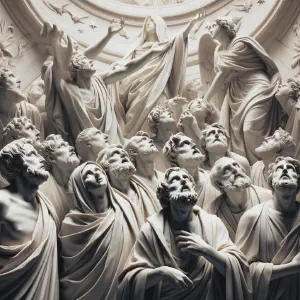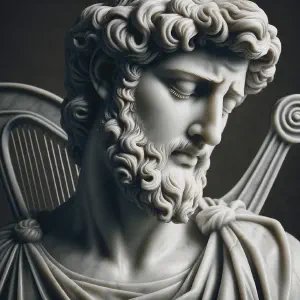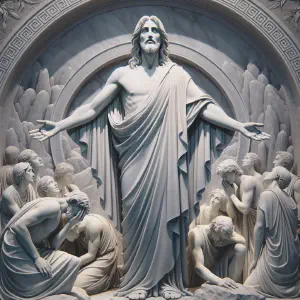Renewal of the Weary

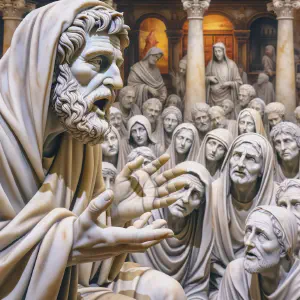
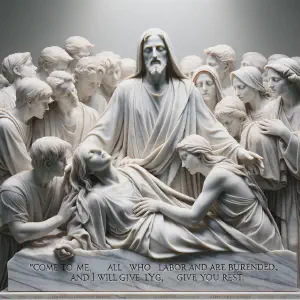
As dawn broke, the words of Jesus, as told in the Gospel of Matthew, spread like a gentle breeze through the village. “Come to me, all who labor and are burdened, and I will give you rest,” he invited. His promise of rest for the weary and burdened hearts echoed profoundly within them. They understood that the yoke offered by the humble and meek Jesus was not a burden, but a source of rest and renewal. With renewed hope and hearts uplifted, they embraced a new day, their spirits soaring like eagles, their steps unburdened and their path lit by a divine light.
Five Questions
What is the significance of the imagery of soaring eagles in Isaiah 40:25-31?
The imagery of soaring eagles is a powerful metaphor for spiritual renewal and strength. It signifies how those who place their trust in the Lord will find their strength renewed. Just as eagles soar high with seemingly effortless grace, individuals who hope in the Lord are promised a rejuvenation of their spirit, enabling them to face life’s challenges without growing weary or faint.
How does Psalm 103 contribute to the theme of mercy and compassion in this story?
Psalm 103 beautifully complements the story by highlighting God’s boundless mercy and compassion. It reminds us that God is not just a creator of immense power but also one of deep kindness. He pardons, heals, and redeems, traits that reassure us of His gentle, loving nature. This Psalm, therefore, reinforces the message that our relationship with God is defined by His grace, not by our imperfections.
In Matthew 11:28-30, Jesus invites the burdened to come to Him. How does this invitation relate to the overall message of the story?
Jesus’ invitation to the burdened is central to the story’s theme of finding rest and solace in God’s presence. It’s a call to all who are weary to find comfort and peace in Him. This invitation reflects the understanding and empathetic nature of Christ, highlighting that His yoke is one of love and support, not of burden and hardship. It reassures us that in Him, we find a haven of rest and a lightened load.
Can you elaborate on how the theme of renewal is woven throughout these scriptures?
The theme of renewal is a golden thread that runs through these scriptures. In Isaiah, it’s portrayed as the renewal of strength for the weary. The Psalm emphasizes renewal through God’s mercy and forgiveness, while in Matthew, it’s presented as the renewal of the soul through rest in Christ. Each passage, in its unique way, converges on the idea that with God, there is a continual process of being uplifted, healed, and revitalized.
How do these readings encourage individuals facing modern-day challenges?
These readings offer timeless wisdom for modern-day challenges. They remind us that in times of exhaustion, uncertainty, or despair, we are not alone or forgotten. The Lord’s enduring strength, compassion, and rest are always accessible. They encourage us to lean on God’s eternal might and tender care, reassuring us that in Him, we can find the strength to persevere, the grace to heal, and the peace to endure whatever comes our way.
Bible Study
Isaiah 40:25-31
To whom can you liken me as an equal?
says the Holy One.
Lift up your eyes on high
and see who has created these things:
He leads out their army and numbers them,
calling them all by name.
By his great might and the strength of his power
not one of them is missing!
Why, O Jacob, do you say,
and declare, O Israel,
“My way is hidden from the LORD,
and my right is disregarded by my God”?
Do you not know
or have you not heard?
The LORD is the eternal God,
creator of the ends of the earth.
He does not faint nor grow weary,
and his knowledge is beyond scrutiny.
He gives strength to the fainting;
for the weak he makes vigor abound.
Though young men faint and grow weary,
and youths stagger and fall,
They that hope in the LORD will renew their strength,
they will soar as with eagles’ wings;
They will run and not grow weary,
walk and not grow faint.
This passage from Isaiah portrays God as the incomparable Creator, emphasizing His omnipotence and omniscience. Isaiah, a major prophet in the Old Testament, speaks to the people of Israel, reminding them of God’s unparalleled power and care for His creation. The passage aligns with Catholic values by underlining God’s omnipresence and infinite strength, reflecting the Catholic understanding of God’s nature. It also resonates with the theme of hope and trust in God, a core aspect of Catholic faith, and mirrors the Beatitudes’ message of comfort for those who endure hardship.
Psalm 103:1-2, 3-4, 8 and 10
R. (1) O bless the Lord, my soul!
Bless the LORD, O my soul;
and all my being, bless his holy name.
Bless the LORD, O my soul,
and forget not all his benefits.
R. O bless the Lord, my soul!
He pardons all your iniquities,
he heals all your ills.
He redeems your life from destruction,
he crowns you with kindness and compassion.
R. O bless the Lord, my soul!
Merciful and gracious is the LORD,
slow to anger and abounding in kindness.
Not according to our sins does he deal with us,
nor does he requite us according to our crimes.
R. O bless the Lord, my soul!
Authored by King David, a central figure in the Old Testament known for his deep faith and complex relationship with God, this Psalm praises God’s merciful and compassionate nature. It underscores God’s readiness to forgive, heal, and redeem, themes central to Catholic teachings on God’s boundless mercy. This Psalm aligns with the Catholic Church’s teachings on the nature of God, particularly in relation to grace, mercy, and the acts of mercy. It echoes the Lord’s Prayer’s emphasis on forgiveness and reflects the Beatitudes’ blessing of mercy.
Matthew 11:28-30
Jesus said to the crowds:
“Come to me, all you who labor and are burdened,
and I will give you rest.
Take my yoke upon you and learn from me,
for I am meek and humble of heart;
and you will find rest for yourselves.
For my yoke is easy, and my burden light.”
In this passage, Jesus Christ, the central figure of the New Testament and the Son of God in Christian belief, invites all who are weary to find rest in Him. This aligns with Catholic values of seeking solace and peace in Christ, especially in the Sacrament of Reconciliation and the Eucharist. It emphasizes the Catholic teaching of Christ’s dual nature as fully human and fully divine, being able to understand human suffering. The passage also reflects Catholic teachings on humility, service, and the importance of embracing Jesus’ teachings and example in daily life.
Lessons
These sacred readings impart the profound lesson that in our moments of weariness and burden, we are not forsaken. The Lord, in His infinite strength and understanding, extends an unyielding support to those who feel weak and overwhelmed. We are gently reminded that our Creator, ever merciful and compassionate, is a constant source of renewal. His invitation through Christ to find rest in Him assures us of a yoke that is not burdensome but liberating. In embracing this divine promise, we find our strength renewed, and our spirits lifted, akin to soaring eagles, emboldened by faith and fortified by His endless grace.
Meditation Prayer
